PHUKET: At least four widely-read Thai-language news outlets published sections of a Reuters special report on Rohingya boatpeople yet have not been sued by the Royal Thai Navy, Phuket journalist Chutima Sidasathian said today.
A captain acting on behalf of the navy is using Thailand's controversial criminal defamation legislation and the Computer Crimes Act to sue Phuketwan journalists Alan Morison, Chutima Sidasathian and their employer, Phuket-based Big Island Media.
It's the first time the military has sued the media in this way in Thailand. Observers say it's more in keeping with behavior in a military dictatorship than in a democracy.
Phuketwan has won international awards and consistent praise for continuing its coverage of the treatment of the stateless, persecuted Rohingya in Thailand.
Morison and Khun Chutima believe the Royal Thai Navy is a good organisation but that the decision to prosecute them will lead to its reputation being severely damaged.
The case brought by Captain Panlob Komtonlok of Royal Thai Navy 3 cites one paragraph from the Reuters special report that Phuketwan reproduced word-for-word in excerpts published the same day, July 17 last year.
''What's odd is that Captain Panlob and the Royal Thai Navy are not mentioned in the paragraph in the English language used by Reuters and Phuketwan yet the Royal Thai Navy is mentioned twice in the Thai translation of the paragraph presented to police,'' Morison said today.
''The problem for the Royal Thai Navy lies with their poor translation. If they are relying on this translation to prosecute us, then we will show the court the original report and point out the Navy's big mistake.
''To sue journalists for words that aren't there and that in the case of Phuketwan we didn't write is a sad error of judgement, possibly made on bad advice from others.''
A document obtained from Phuket's Vichit Police Station earlier this week reveals that the go-ahead for the action by Captain Panlob was eventually approved by the Assistant Commander in Chief of the Royal Thai Navy, Admiral Polawat Sirodom on October 4.
''It's staggering that the Navy has taken this action in defence of its reputation yet done nothing to repudiate any of the claims they falsely believe are contained in the paragraph,'' Morison said.
''What usually happens if the military in a democracy takes offence at something written by the media is that a senior officer calls the journalists to tell them they have it wrong or holds a media conference to explain their point of view.
''The Royal Thai Navy has instead singled out Phuketwan for a particularly onerous form of court action. No wonder people are puzzled by the Navy's behavior.''
The journalists are scheduled to appear at the Phuket Prosecutor's Office on March 10. If the prosecution goes ahead, they will face the charges in Phuket Provincial Court later that day. The pair could face up to seven years in jail.
Morison has said that as a protest for media freedom, he will go to jail rather than apply for bail.
On July 17 Captain Panlob also made a complaint against Reuters, the originators of the contentious paragraph, but that complaint (490/2556) is proceeding at a much slower pace than the complaint against Phuketwan (489/2556).
No paperwork has been served on the two Reuters journalists or on Reuters. One of the authors is soon to be transferred from Bangkok to Washington, according to the Facebook posting of a former Reuters bureau chief. The international news agency employs about 1000 Thai staff.
The paragraph wrongly translated by the Royal Thai Navy in pressing its case against Phuketwan was also similarly mistranslated in articles based on the Reuters report and republished close to July 17 in sanuk.com, thaipost.net, tnews.co.th and manager.co.th.
It is believed no action has been taken against those online publications, even though what's published is much closer to the Thai-language mistranslation supplied by the Royal Thai Navy to the investigating police officers.
United Nations
''Criminal prosecution for defamation has a chilling effect on freedom of the press,'' said Ravina Shamdasani, the spokesperson for the Office of the High Commissioner for Human Rights. ''International standards are clear that imprisonment is never an appropriate penalty for defamation.''
Human Rights Watch
''The Thai navy's lawsuit is a reckless attempt to curtail journalists' reporting on alleged human trafficking by its officers,'' said Brad Adams, Asia director at Human Rights Watch. ''Unless the government withdraws the case, its impact will be felt far beyond those reporting on abuses against the Rohingya - and could have a choking effect on all investigative reporting in Thailand.''
Reporters Without Borders
"It is intolerable that journalists are being prosecuted for just doing their job by relaying information of general interest that had already been made public," Reporters Without Borders said. "Bringing charges under the controversial Computers Crimes Act in a defamation case is indicative of the critical state of freedom of information in Thailand and amounts to an attempt to gag the media. We support these journalists, who are facing a jail term, and we call for the immediate withdrawal of these proceedings."
Committee to Protect Journalists
''Rather than shooting the messenger, the Royal Thai Navy would be better suited launching an internal investigation into the serious allegations of abuse that have been raised,'' said Shawn Crispin, CPJ's senior Southeast Asia representative. ''This type of legal intimidation aims ultimately at discouraging media reporting on allegations of serious human rights abuses.''
Chris Lewa, director of the rights group the Arakan Project
''Thanks to the fair investigative reporting by the Phuketwan journalists, the involvement of various Thai agencies in the massive smuggling and trafficking operations of Rohingya refugees and their related miseries is no more a secret. Rights groups should unite to call on Thailand to quash these defamation charges.''
Phuketwan
''We wish the Royal Thai Navy would clear its reputation by explaining precisely what is happening to the Rohingya in the Andaman Sea and in Thailand,'' Phuketwan said in a statement released in response to the charges. ''By instead using a controversial law against us, the Navy is, we believe, acting out of character.''
Bangkok Post
The action makes the navy look like a bully, and gives the impression the admirals would like to intimidate the media. Instead of defending the navy's honor, the criminal defamation suit holds it to question. Instead of silencing the media about the story - concerning the navy's role in the mistreatment of Rohingya boatpeople - the lawsuit repeats it, to more people and at greater length.
CNN
Morison said: "The navy's action over one paragraph has created a perfect storm. If the navy proceeds with the case, the Rohingya issue is now tied up in their action against media under a controversial law."
TIME
In the meantime, calmer seas mean that even more Rohingya are expected to attempt the treacherous journey in the weeks ahead. Nothing could gladden the traffickers more.
Reuters
Barb Burg, Reuters' global head of communications: ''Our story was fair and balanced and Reuters has not been accused of criminal libel.''
Bill Barnett (The Phuket Insider)
The issues which have drawn Phuketwan into this fray are profound and disturbing. There should be no need to wax over reality and respect needs to be given to those who stand up for the helpless who cannot help themselves.
Andrew Drummond (Investigative Journalist)
We should all support journalists who are doing a difficult job here under laws which best suit a totalitarian state.
Excellence in Human Rights Reporting, Investigative Reporting awards
In 2010 the Phuketwan team shared the Society of Publishers in Asia Award for Excellence in Investigative Reporting and a second Award for Excellence in Human Rights Reporting, with the South China Morning Post newspaper. Judges said of the Excellence in Investigative Reporting award: ''An excellent series that uncovered serious government abuses and had a material impact in correcting them. Exclusivity. Strong reporting. Hard-hitting piece with international implications.''
Of the Excellence in Human Rights Reporting award, the judges said: ''Excellent investigative work that exposed serious human rights abuses of oppressed people. Intrepid reporting of a hidden subject. This is a high-caliber series buttressed by solid on-the-ground reporting and great pictures. All militaries are challenging subjects for investigative reporters and Thailand's is no exception. The team clearly went to great lengths to get sources, break news, and provide the details that prodded the government into action.''
A captain acting on behalf of the navy is using Thailand's controversial criminal defamation legislation and the Computer Crimes Act to sue Phuketwan journalists Alan Morison, Chutima Sidasathian and their employer, Phuket-based Big Island Media.
It's the first time the military has sued the media in this way in Thailand. Observers say it's more in keeping with behavior in a military dictatorship than in a democracy.
Phuketwan has won international awards and consistent praise for continuing its coverage of the treatment of the stateless, persecuted Rohingya in Thailand.
Morison and Khun Chutima believe the Royal Thai Navy is a good organisation but that the decision to prosecute them will lead to its reputation being severely damaged.
The case brought by Captain Panlob Komtonlok of Royal Thai Navy 3 cites one paragraph from the Reuters special report that Phuketwan reproduced word-for-word in excerpts published the same day, July 17 last year.
''What's odd is that Captain Panlob and the Royal Thai Navy are not mentioned in the paragraph in the English language used by Reuters and Phuketwan yet the Royal Thai Navy is mentioned twice in the Thai translation of the paragraph presented to police,'' Morison said today.
''The problem for the Royal Thai Navy lies with their poor translation. If they are relying on this translation to prosecute us, then we will show the court the original report and point out the Navy's big mistake.
''To sue journalists for words that aren't there and that in the case of Phuketwan we didn't write is a sad error of judgement, possibly made on bad advice from others.''
A document obtained from Phuket's Vichit Police Station earlier this week reveals that the go-ahead for the action by Captain Panlob was eventually approved by the Assistant Commander in Chief of the Royal Thai Navy, Admiral Polawat Sirodom on October 4.
''It's staggering that the Navy has taken this action in defence of its reputation yet done nothing to repudiate any of the claims they falsely believe are contained in the paragraph,'' Morison said.
''What usually happens if the military in a democracy takes offence at something written by the media is that a senior officer calls the journalists to tell them they have it wrong or holds a media conference to explain their point of view.
''The Royal Thai Navy has instead singled out Phuketwan for a particularly onerous form of court action. No wonder people are puzzled by the Navy's behavior.''
The journalists are scheduled to appear at the Phuket Prosecutor's Office on March 10. If the prosecution goes ahead, they will face the charges in Phuket Provincial Court later that day. The pair could face up to seven years in jail.
Morison has said that as a protest for media freedom, he will go to jail rather than apply for bail.
On July 17 Captain Panlob also made a complaint against Reuters, the originators of the contentious paragraph, but that complaint (490/2556) is proceeding at a much slower pace than the complaint against Phuketwan (489/2556).
No paperwork has been served on the two Reuters journalists or on Reuters. One of the authors is soon to be transferred from Bangkok to Washington, according to the Facebook posting of a former Reuters bureau chief. The international news agency employs about 1000 Thai staff.
The paragraph wrongly translated by the Royal Thai Navy in pressing its case against Phuketwan was also similarly mistranslated in articles based on the Reuters report and republished close to July 17 in sanuk.com, thaipost.net, tnews.co.th and manager.co.th.
It is believed no action has been taken against those online publications, even though what's published is much closer to the Thai-language mistranslation supplied by the Royal Thai Navy to the investigating police officers.
What Others Say
United Nations
''Criminal prosecution for defamation has a chilling effect on freedom of the press,'' said Ravina Shamdasani, the spokesperson for the Office of the High Commissioner for Human Rights. ''International standards are clear that imprisonment is never an appropriate penalty for defamation.''
Human Rights Watch
''The Thai navy's lawsuit is a reckless attempt to curtail journalists' reporting on alleged human trafficking by its officers,'' said Brad Adams, Asia director at Human Rights Watch. ''Unless the government withdraws the case, its impact will be felt far beyond those reporting on abuses against the Rohingya - and could have a choking effect on all investigative reporting in Thailand.''
Reporters Without Borders
"It is intolerable that journalists are being prosecuted for just doing their job by relaying information of general interest that had already been made public," Reporters Without Borders said. "Bringing charges under the controversial Computers Crimes Act in a defamation case is indicative of the critical state of freedom of information in Thailand and amounts to an attempt to gag the media. We support these journalists, who are facing a jail term, and we call for the immediate withdrawal of these proceedings."
Committee to Protect Journalists
''Rather than shooting the messenger, the Royal Thai Navy would be better suited launching an internal investigation into the serious allegations of abuse that have been raised,'' said Shawn Crispin, CPJ's senior Southeast Asia representative. ''This type of legal intimidation aims ultimately at discouraging media reporting on allegations of serious human rights abuses.''
Chris Lewa, director of the rights group the Arakan Project
''Thanks to the fair investigative reporting by the Phuketwan journalists, the involvement of various Thai agencies in the massive smuggling and trafficking operations of Rohingya refugees and their related miseries is no more a secret. Rights groups should unite to call on Thailand to quash these defamation charges.''
Phuketwan
''We wish the Royal Thai Navy would clear its reputation by explaining precisely what is happening to the Rohingya in the Andaman Sea and in Thailand,'' Phuketwan said in a statement released in response to the charges. ''By instead using a controversial law against us, the Navy is, we believe, acting out of character.''
Bangkok Post
The action makes the navy look like a bully, and gives the impression the admirals would like to intimidate the media. Instead of defending the navy's honor, the criminal defamation suit holds it to question. Instead of silencing the media about the story - concerning the navy's role in the mistreatment of Rohingya boatpeople - the lawsuit repeats it, to more people and at greater length.
CNN
Morison said: "The navy's action over one paragraph has created a perfect storm. If the navy proceeds with the case, the Rohingya issue is now tied up in their action against media under a controversial law."
TIME
In the meantime, calmer seas mean that even more Rohingya are expected to attempt the treacherous journey in the weeks ahead. Nothing could gladden the traffickers more.
Reuters
Barb Burg, Reuters' global head of communications: ''Our story was fair and balanced and Reuters has not been accused of criminal libel.''
Bill Barnett (The Phuket Insider)
The issues which have drawn Phuketwan into this fray are profound and disturbing. There should be no need to wax over reality and respect needs to be given to those who stand up for the helpless who cannot help themselves.
Andrew Drummond (Investigative Journalist)
We should all support journalists who are doing a difficult job here under laws which best suit a totalitarian state.
Excellence in Human Rights Reporting, Investigative Reporting awards
In 2010 the Phuketwan team shared the Society of Publishers in Asia Award for Excellence in Investigative Reporting and a second Award for Excellence in Human Rights Reporting, with the South China Morning Post newspaper. Judges said of the Excellence in Investigative Reporting award: ''An excellent series that uncovered serious government abuses and had a material impact in correcting them. Exclusivity. Strong reporting. Hard-hitting piece with international implications.''
Of the Excellence in Human Rights Reporting award, the judges said: ''Excellent investigative work that exposed serious human rights abuses of oppressed people. Intrepid reporting of a hidden subject. This is a high-caliber series buttressed by solid on-the-ground reporting and great pictures. All militaries are challenging subjects for investigative reporters and Thailand's is no exception. The team clearly went to great lengths to get sources, break news, and provide the details that prodded the government into action.''

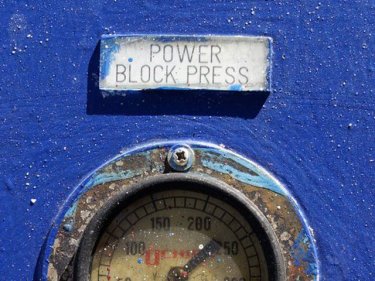

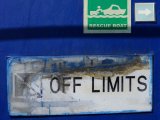


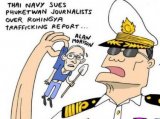
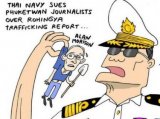
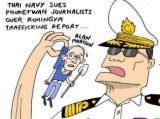
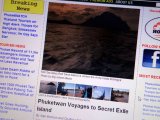




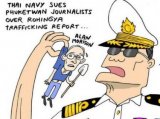

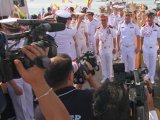














Any chance of you ceasing ramming this down our throats? ... (moderated).
Posted by Amazed in Thailand on March 3, 2014 12:30
Editor Comment:
We recognise an important international story when we see one, AiT, even if it's a tragedy for freedom of expression in Thailand and we are involved. There are other outlets that aren't covering this issue. I suggest you spend more time there.